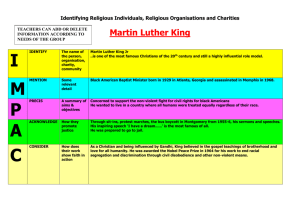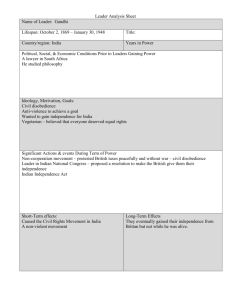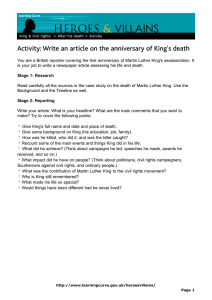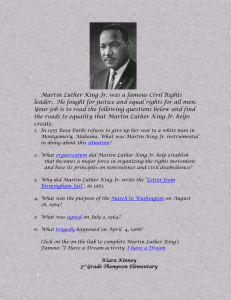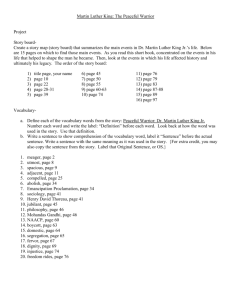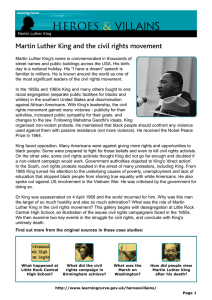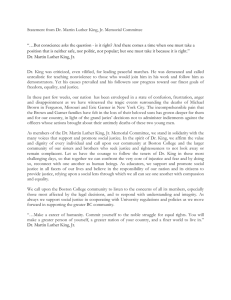A Conversation with Dr. Martin Luther King, Jr.
advertisement
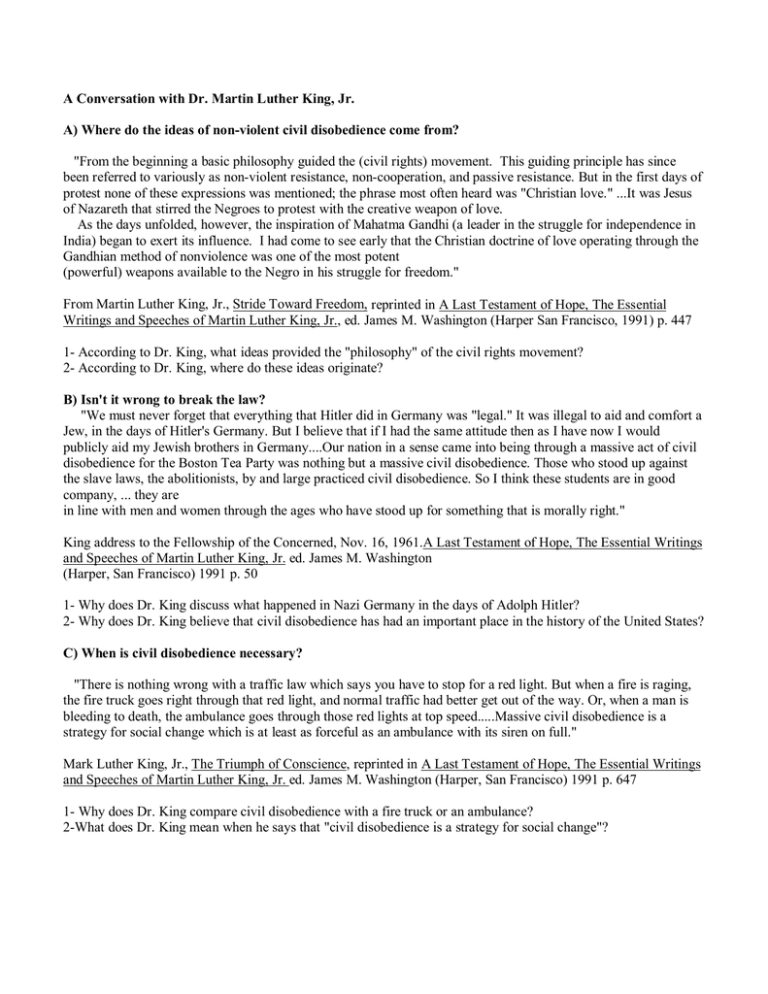
A Conversation with Dr. Martin Luther King, Jr. A) Where do the ideas of non-violent civil disobedience come from? "From the beginning a basic philosophy guided the (civil rights) movement. This guiding principle has since been referred to variously as non-violent resistance, non-cooperation, and passive resistance. But in the first days of protest none of these expressions was mentioned; the phrase most often heard was "Christian love." ...It was Jesus of Nazareth that stirred the Negroes to protest with the creative weapon of love. As the days unfolded, however, the inspiration of Mahatma Gandhi (a leader in the struggle for independence in India) began to exert its influence. I had come to see early that the Christian doctrine of love operating through the Gandhian method of nonviolence was one of the most potent (powerful) weapons available to the Negro in his struggle for freedom." From Martin Luther King, Jr., Stride Toward Freedom, reprinted in A Last Testament of Hope, The Essential Writings and Speeches of Martin Luther King, Jr., ed. James M. Washington (Harper San Francisco, 1991) p. 447 1- According to Dr. King, what ideas provided the "philosophy" of the civil rights movement? 2- According to Dr. King, where do these ideas originate? B) Isn't it wrong to break the law? "We must never forget that everything that Hitler did in Germany was "legal." It was illegal to aid and comfort a Jew, in the days of Hitler's Germany. But I believe that if I had the same attitude then as I have now I would publicly aid my Jewish brothers in Germany....Our nation in a sense came into being through a massive act of civil disobedience for the Boston Tea Party was nothing but a massive civil disobedience. Those who stood up against the slave laws, the abolitionists, by and large practiced civil disobedience. So I think these students are in good company, ... they are in line with men and women through the ages who have stood up for something that is morally right." King address to the Fellowship of the Concerned, Nov. 16, 1961.A Last Testament of Hope, The Essential Writings and Speeches of Martin Luther King, Jr. ed. James M. Washington (Harper, San Francisco) 1991 p. 50 1- Why does Dr. King discuss what happened in Nazi Germany in the days of Adolph Hitler? 2- Why does Dr. King believe that civil disobedience has had an important place in the history of the United States? C) When is civil disobedience necessary? "There is nothing wrong with a traffic law which says you have to stop for a red light. But when a fire is raging, the fire truck goes right through that red light, and normal traffic had better get out of the way. Or, when a man is bleeding to death, the ambulance goes through those red lights at top speed.....Massive civil disobedience is a strategy for social change which is at least as forceful as an ambulance with its siren on full." Mark Luther King, Jr., The Triumph of Conscience, reprinted in A Last Testament of Hope, The Essential Writings and Speeches of Martin Luther King, Jr. ed. James M. Washington (Harper, San Francisco) 1991 p. 647 1- Why does Dr. King compare civil disobedience with a fire truck or an ambulance? 2-What does Dr. King mean when he says that "civil disobedience is a strategy for social change"? D) Doesn't protest create hard feelings? Shouldn't people just talk about their differences? "Why direct action? Why sit-ins, marches, and so forth? Isn't negotiation a better path?" You are quite right in calling for negotiations. Indeed this is the very purpose of direct action. Nonviolent direct action seeks to create such a crisis and foster such a tension that a community which has constantly refused to negotiate is forced to confront the issue. It seeks to dramatize the issue that can no longer be ignored....I have earnestly opposed violent tension, but there is a type of constructive, non-violent tension which is necessary for growth....The purpose of our direct-action program is to create a situation so crisis-packed that it will inevitably open the door to negotiation." Letter from a Birmingham Jail by Rev. Martin Luther King, Jr. April 16, 1963, reprinted in Eyes on the Prize, by Juan Williams (Penguin, NY 1988) p. 187. 1- Why does Dr. King believe that "tension" is an important force for change? 2- According to Dr. King, when will negotiation become possible? E) Why do you choose non-violent resistance over violence? To accept passively an unjust system is to cooperate with that system...Non-cooperation with evil is as much an obligation as is cooperation with good. Violence often brings about momentary results...But...It solves no social problem: it merely creates new and more complicated ones. Martin Luther King, Jr. Stride Toward Freedom.(Harper: 1958) pp. 212-217. Reprinted in Feder Viewpoints: USA. p. 337. 1- How does Dr. King feel about accepting "evil" even if you were not a party to creating it? 2- Why does Dr. King believe that violence is not an effective solution? F) How do your ideas work? The alternative to violence is nonviolent resistance. This method was made famous in our generation by Mohandas K. Gandhi, who used it to free India from the domination of the British empire. ..Points can be made concerning nonviolence as a method in bringing about better racial conditions. First, this is not a method for cowards; it does resist. The nonviolent resister is just as strongly opposed to the evil against which he protests as is the person who uses violence. A second point is that nonviolent resistance does not seek to defeat or humiliate the opponent, but to win his friendship and understanding. A third characteristic of this method is that the attack is directed against forces of evil rather than against persons who are caught in those forces. A fourth point that must be brought out concerning nonviolent resistance is that it avoids not only external physical violence but also internal violence of spirit. At the center of nonviolence stands the principle of love." Christian Century (Feb. 6, 1957) p. 165-167, reprinted in A Last Testament of Hope, The Essential Writings and Speeches of Martin Luther King, Jr. ed. James M. Washington (Harper San Francisco, 1991) p. 7-8. 1- According to Dr. King, what are the main principles of nonviolent civil disobedience? 2- Why does Dr. King say that "this is not a method for cowards"?
